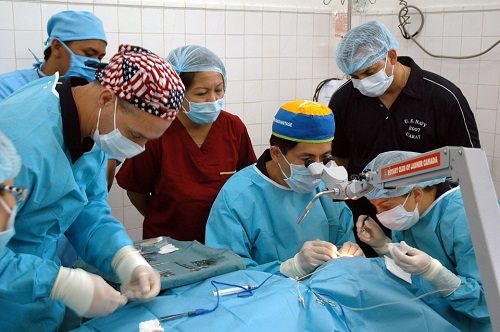According to the National Association of Clinical Nurse Specialists (NACNS), clinical nurse specialists (CNSs) have been a part of the health care system in America for over 60 years. A CNS is an advanced practice registered nurse (APRN) who has earned a Master’s of Science in Nursing (MSN) or Doctor of Nursing Practice (DNP) and who specializes in a specific field of nursing care. Clinical nurse specialists are leaders in their field and are seen as mentors, educators, and advocates to aid patients and their fellow nurses.
 IMAGE SOURCE: Pixabay, public domain
IMAGE SOURCE: Pixabay, public domain
Education for Clinical Nurse Specialists
Since a CNS is an APRN, the education path will take time. Typically, the first step to becoming a registered nurse (RN) is either an associate’s degree in nursing (ADN) or a Bachelor’s of Science in Nursing (BSN). However, since advanced schooling is required to become an APRN, you it is a good idea to earn a BSN right off the bat. Most MSN programs want students to have a BSN rather than an ADN, according to U.S. News & World Report. After earning your degree, the next step to becoming an RN is to take and pass the NCLEX-RN exam. Another benefit of completing a BSN degree before taking the NCLEX-RN is that your more extensive education will make it easier to pass this exam.
Once you are an RN, you can start working towards becoming an APRN. The National Council of State Boards of Nursing (NCSBN) states that APRNs will need a Master’s of Science in Nursing (MSN) degree or higher level of education. However, when planning for your graduate education, you may want to consider earning a Doctorate of Nursing Practice (DNP) instead of the MSN degree. While the MSN is enough to become an APRN, the American Association of Colleges of Nursing (AACN) is proposing that APRNs hold a doctorate degree rather than a master’s degree. This idea had caused some schools to start transitioning their MSN programs into DNP programs.
Students with a BSN have a six percent higher pass rate on the NCLEX-RN exam than those with an ADN.
Clinical Nurse Specialist Certification Options
The American Nurses Credentialing Center (ANCC) previously had ten different certifications for CNSs but has since retired all but one of them. Currently, the ANCC only offers the Adult-Gerontology Clinical Nurse Specialist Certification (AGCNS-BC). To be eligible for this certification, you must have an RN license and a master’s or doctoral degree from an adult-gerontology clinical nurse specialist program. You must also have 500 faculty-supervised clinical hours in the adult-gerontology clinical nurse specialist role with a senior citizen population. You will also need three separate graduate-level courses in the following categories: advanced physiology/pathophysiology, advanced health assessment, and advanced pharmacology.
However, the American Association of Critical-Care Nurses (AACN) offers three different certifications for CNSs. This organization has its own Adult-Gerontology Clinical Nurse Specialist Certification (ACCNS-AG), though with a slightly different acronym. To be eligible for this certification, you must have a current RN or APRN license and have completed an adult-gerontology CNS graduate-level program. The AACN also offers a Pediatric Clinical Nurse Specialist Certification (ACCNS-P), which requires a pediatric CNS graduate-level program, as well as a Neonatal Clinical Nurse Specialist Certification (ACCNS-N), which requires a neonatal CNS graduate-level program.
According to the NACNS, the only current certifications based on population are adult/gerontology, pediatrics, and neonatology.
Clinical Nurse Specialists’ Practice
Clinical nurse specialists’ specialties are based on population such as pediatrics, settings such as the emergency room, disease or medical subspecialty such as diabetes, type of care such as psychiatric, or type of problem such as pain. Whichever area they specialize in, CNSs are considered leaders that help promote and facilitate change.
The NACNS came up with a Clinical Nurse Specialist Sphere of Influence to show what aspects of the healthcare system they help influence. Two sections, nurses/nursing practice and organization/system are on two different sides with patient circling and encompassing everything. This is because everything Clinical Nurse Specialists do is to benefit patients. Whether it is diagnosing, treating or managing patients themselves, or providing support to the nurses who are at the bedside of patients, CNSs strive to help fill in any potential gaps in the health care system and to improve the overall care of patients. Some results of their work include lowering costs and length of stay for patients, reducing rates of medical complications, and increasing patient satisfaction, sometimes with better pain management practices.
Clinical Nurse Specialists both improve the healthcare system and enjoy a median salary of $85,723, with the potential to earn up to $116,950, according to PayScale.

